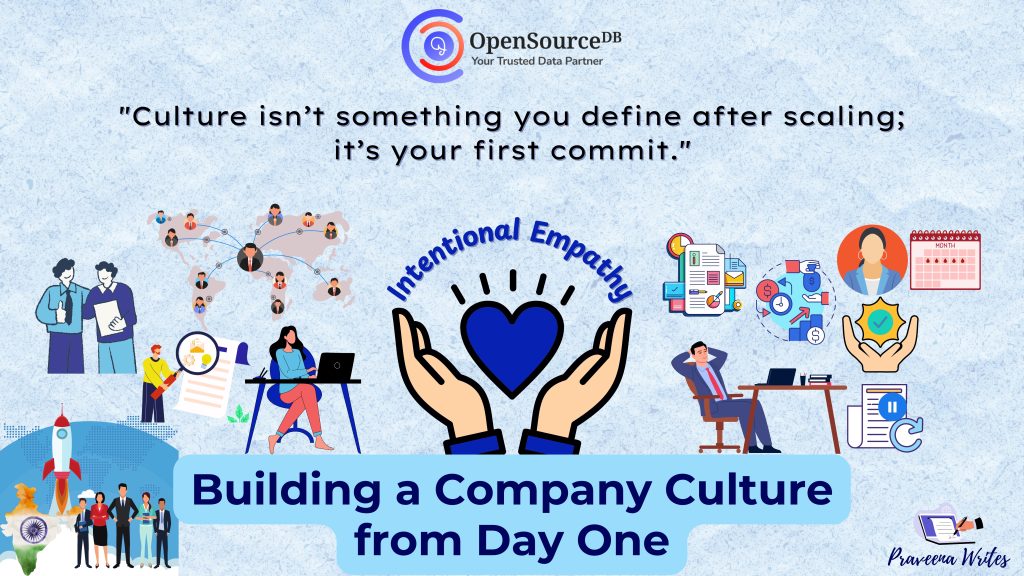
When we started OpenSource DB four years ago, we didn’t have a ten-slide pitch deck or a well-funded war chest. What we had was a conviction: that open-source deserved a louder voice in India—and that Postgres professionals needed more than just code. They needed community.
What we didn’t realize then—but hold as truth now—is this: culture isn’t something you define after scaling; it’s your first commit.
It’s in how you write that first README, how you respond to your first support request, and how you welcome the first person who says, “I’d love to join you.”
Culture Isn’t Perks — It’s Priorities
From day one, we were:
- Remote-first
- Asynchronous by design
- Transparent by necessity
Not because it was fashionable, but because it was the only way a scrappy, distributed team could function across time zones and full-time jobs. We had no office—just weekend calls, Telegram threads that never slept, and more Google Docs than we care to count.
But we did have something else: #SHARED #VALUES.
We cared about mentorship, representation, and doing things the right way, even if it meant moving slower. We gave credit publicly. We showed up at community events. We documented everything. Those values became our cultural DNA.
Culture is set by what you reward
One of our earliest team members once said,
“This is the first place where I feel like I matter, not just my output.”
That was a wake-up call.
At OpenSource DB, we celebrate curiosity as much as competence.
We recognize the people who review pull requests, not just those who push code.
We reward questions like:
“How can we make this more inclusive?”
“Who might this exclude?”
“What does long-term trust look like here?”
It’s how we build a team, not just a flurry of Postgres services
We didn’t get it right all the time
We made mistakes. We said “yes” too much.
People burned out. Conflicts simmered. Boundaries blurred.
We learned—sometimes painfully—that trying to “do it all” was not sustainable.
That saying “no” is also a cultural signal.
And that care must be consistent, not performative.
So, we learned to:
- Pause intentionally
- Document deeply
- Rest without guilt
- Compensate fairly
- Revisit our values every year
A Culture of Care and Inclusion
One of the most defining traits of OpenSource DB’s culture is intentional empathy.
From the outset, we built a team where women weren’t just contributors, they were core to leadership. With that came a responsibility to acknowledge lived realities.
That’s why we introduced Optional Menstrual Leave (OML)—a simple, dignity-first policy designed for flexibility and trust.
There’s no paperwork. No approvals. Just self-agency.
And we’ve seen the impact: better retention, open conversations, and a deeper sense of belonging.
This kind of culture doesn’t show up in all-hands slides.
It shows up when someone says, “I felt seen today.”
Culture is your Legacy, not a line item
Today, OpenSource DB is growing:
- We’ve launched PgHyd, PgVizag
- We’re nurturing the Postgres Women India community
- We’re collaborating globally—with CYBERTEC in Europe, DBtune in Canada, and with open-source leaders around the world
- And we’re creating more full-time roles in the PostgreSQL ecosystem
But the real foundation? It’s still the culture we wrote in our first cut of website.
Because in the end, when the logos change and the infra scales, what people remember is how it felt to be part of your story.
That’s your culture. That’s your legacy.
And for us, it all started on day one.
Side Note: You’re Not Alone on This Journey
Many founders are building with values at the center.
We’re proud to be part of a growing wave of founders building in India for the world, with intention.
